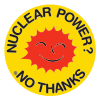This article needs additional citations for verification. (June 2018) |
| Anti-nuclear movement |
|---|
 |
| By country |
| Lists |
The anti-nuclear movement in Russia is a social movement against nuclear technologies, largely stemming from the results of the Chernobyl incident in 1986. During the most active phase of the anti-nuclear movement, from 1988 to 1992, construction of over 100 nuclear projects were prevented on the territory of the Soviet Union. Also, the economic troubles of the 1990s led to a reduction in the number of construction projects. This deprived the anti-nuclear movement of its raison d’être. At the same time, it too was affected by financial difficulties, in particular the lack of donations, which continues to be an issue today. Since the 2000s the Russian Government embarked on highly pro-nuclear policy, with plans to invest billions of dollars in developing the nuclear industry, which leaves the movement with big challenges.
The first nuclear power plant in Russia was built in 1954, a 5 MWe reactor in Obninsk. In the several years prior to 1954, Russia began building more nuclear power plants, and by the mid-1980s, had built a total of twenty-five reactors.[1] By the early 2000s, Russia has about ten nuclear power plants and thirty-one operating reactors. With these new nuclear power plants and reactors, eight out of the ten nuclear power plants can be found in the European part of Russia. In the Eastern part of Urals, two other nuclear power plants can be found.[2]
Russia has a long history of nuclear power plants. It was beneficial to the country when it first began but the view quickly changed in the post-Chernobyl period.[3] On April 26, 1986 when the Chernobyl Nuclear Plant malfunctioned, it gave birth to the anti-nuclear movement in Russia and many anti-nuclear organizations emerged in the USSR. Many of these anti-nuclear protest or activities took place in the 1980s, which motivated people to pursue the anti-nuclear law that was later to be found to be short lived, due to the collapse of the Soviet Union.[3] In the earlier years of the anti-nuclear movement, there were several activists that followed help assist in the movement to pursue the goal of becoming a denuclearized country.
- ^ "Nuclear Power in Russia | Russian Nuclear Energy - World Nuclear Association". www.world-nuclear.org. Retrieved 2018-04-24.
- ^ Cite error: The named reference
:0was invoked but never defined (see the help page). - ^ a b Dawson, Jane (1995). "Anti-nuclear activism in the USSR and its successor states: A surrogate for nationalism?". Environmental Politics. 4 (3): 441–466. doi:10.1080/09644019508414215 – via Academic Search Premier.
